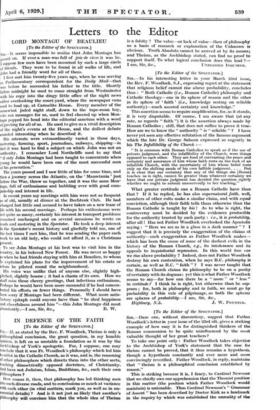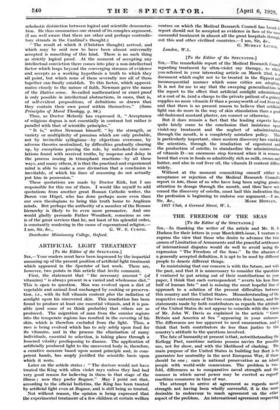[To the Editor of the SPECTATOR.] Sra,—Dare one, without discourtesy,
suggest that Father. Woodlock's letter in your issue of the 23rd ult. gives a striking example of how easy it is for distinguished thinkers of the Roman communion to be quite uninfluenced by the most
valuable thought of her great teachers ?
To take one point only : Father Woodlock takes objection to the Archbishop of York's statement that the case for theism cannot be proved, that it thus remains a hypothesis, though a hypothesis constantly and ever more and more convincingly reverified. Father Woodlock, in reply, maintains that "theism is a philosophical conclusion established by reason."
This is striking because it is, I fancy, to Cardinal Newman that we chiefly owe our apprehension that the Thomist position in this matter (the position which Father Woodlock would maintain) is untenable. Thus Cardinal Newman's " Grammar of Assent" has been described by Doctor Kirk as a landmark in the inquiry by which was established the unreality of the
scholastic distinction between logical and scientific demonstra- tion. He thus summarizes one strand of its complex argument. (I am well aware that there are othei and perhaps contradic- tory strands in the Cardinal's thought.) " The result at which it (Christian thought) arrived, and which may be said now to have been almost universally accepted is something of this kind. There is no such thing as strictly logical proof. - At the moment of accepting any intellectual conviction there comes into play a non-intellectual factor which leaps beyond the converging streams of evidence and accepts as a working hypothesis a truth to which they all point, but which none of them severally nor all of them together can finally establish. To this factor, which approxi- mates closely to the nature of faith, Newman gave the name of the illative sense. So-called mathematical or exact proof is only possible in intellectual abstractions, in cases, that is, of self-evident propositions, of definitions so drawn that they contain their own proof within themselves." (Some Principles of Moral Theology, p. 98.) Thus, as Doctor Moberly has expressed it, " Acceptance of religious dogma is not essentially in contrast but rather is parallel with that of scientific principles."
" It is," writes Newman himself, " by the strength, or variety or multiplicity of premises which are only probable, not by invincible syllogisms—by objections overcome, by adverse theories neutralized, by difficulties gradually clearing up, by exceptions proving the rule, by unlooked-for corre- lations found with received truths, by suspense and delay in the process issuing in triumphant reactions—by all these ways, and many others, it is that the practised and experienced mind is able to make a sure divination that a conclusion is inevitable, of which his lines of reasoning do not actually put him in possession."
These quotations are made by Doctor Kirk, but I am responsible for this use of them. I would like myself to add quotations from another great Roman Catholic writer, the Baron von Hiigel, who has done perhaps more even than our own theologians to bring this truth home to Anglican minds. But perhaps the authority of a member of the Roman hierarchy is likely to be even more persuasive. And one would gladly persuade Father Woodlock, conscious as one is of the great services that he, not least of his splendid order, is constantly rendering in the cause of supernatural religion.—







































 Previous page
Previous page